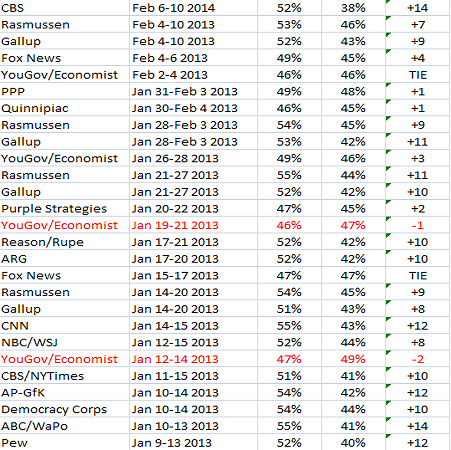 |
| Photo courtesy of Yana Paskova/Getty Images |
In the seemingly never-ending spectacle that is the modern day presidential campaign, the month of March 2015 will likely be remembered for the New York Times story revealing Hillary Clinton skirted State Department rules requiring work-related email retention. The fact that the former New York Senator was conducting government business over a private, in-home family email server dominated 2016 news for days afterwards. Naturally, three weeks into this story, the headlines and questions have taken a toll on Clinton's image.
The days of soaring, rockstar-like favorability ratings have come to an end for Mrs. Clinton (though this trend was emerging even before 'emailgate'). In fact, her post-scandal numbers more closely resemble the contentious days of the 2008 Democratic Primary than the lofty highs from her stint as Secretary of State.
Of the nine surveys to measure Clinton's favorability rating before and after the email scandal broke, all but one found her net favorable rating had dropped in its aftermath. The one that did not was conducted March 1-5, even though the email story broke late in the day on March 2, and didn't reach peak media fervor until days later. The poll was also completed five days before Hillary's largely-panned press conference on March 10.
Beyond the NBC/WSJ poll, Clinton's net favorable rating dropped anywhere from six to twenty-four points before and after the story broke. Economist/YouGov has taken two polls since the Clinton scandal broke, and has measured the smallest drop (from 52/44% on July 7-10, 2014, to an average 48/46% post-controversy).
 |
| The post-controversy Economist/YouGov numbers represent an average of two surveys, one conducted on March 14-16 and March 21-23, 2015. |
Public Policy Polling, of all pollsters, measured Hillary's largest favorability drop. Granted, their pre-email story survey is two years old. Regardless, a 56/37% to 43/48% drop is stark nonetheless.
Clinton averaged a 52/38% favorable/unfavorable rating among pollsters that tested her favorability both before and after the email story. She averaged 46/43% after the story broke.
Other pollsters measured the effect of the email story on Hillary's public image in different ways, and the results are more mixed for the former First Lady.
Economist/YouGov, for example, conducted extensive post-email polling on Clinton, and found doubts about her sincerity up sharply from last year.
On the other hand, a Republican pollster found that just 36% of Americans have a less favorable view Mrs. Clinton as a result of the email scandal. Twenty-nine percent say the same in a recent CBS News survey. For comparison, 45% held a less favorable view of Mitt Romney as a result of the infamous "47%" remark in the early fall of 2012. Thirty-two percent felt the same about Barack Obama's 'You didn't build that' remark earlier that same year.
Furthermore, Hillary's outstanding numbers in the 2016 Democratic Primary are still in great shape:
And while Mrs. Clinton's lead over her potential 2016 GOP contenders dropped across the board in the latest CNN poll, she still maintains double-digit leads against all of them.
It may sound fair to say the Clinton's are nothing if not deceitful. But as they've shown time and time again, they are resilient as well. While emailgate has undoubtedly been unhelpful for Hillaryland, it's not as bad as it could be, and seems far from fatal. Absent new information, Clinton will survive with minor scrapes and bruises.
Updated on March 25 to include new St. Leo University, PPP, Economist/YouGov, and CBS News polls.


















